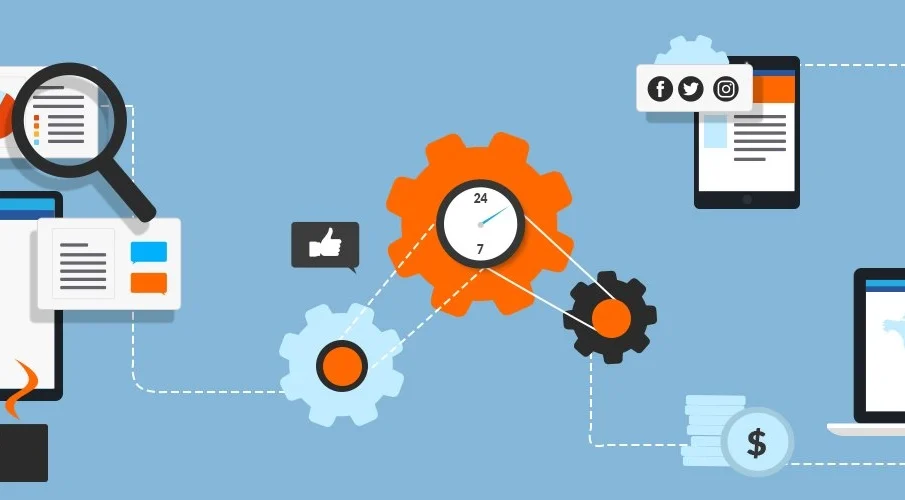Top 10 Automation Tools in Business Used by Top Companies

In the rapidly evolving landscape of business, staying competitive often means leveraging the power of automation. With increasing pressures to do more with less, companies across various industries are turning to automation to streamline operations, reduce costs, improve customer experience, and scale faster. In essence, automation frees businesses from the monotonous tasks that consume valuable time and resources, allowing them to focus on innovation, strategy, and growth.
The adoption of automation technology is no longer the domain of large corporations alone; startups and mid-sized companies are also tapping into its potential to stay ahead. But what specific automation tools are top companies using, and how are they benefiting from them? Below are the top 10 automation tools and strategies that industry leaders are leveraging for efficiency, scalability, and success.
1. Customer Relationship Management (CRM) Automation
At the heart of many businesses is the need to manage customer relationships efficiently. CRM automation tools help companies streamline their sales processes, track interactions, and personalize communication with clients. Tools like Salesforce and HubSpot are widely used across industries to automate lead management, follow-up emails, and sales pipeline updates.
-
Salesforce automates tasks such as lead qualification, follow-up reminders, and customer data entry, allowing sales teams to focus on high-value tasks. It also enables companies to track customer interactions across multiple channels, providing a 360-degree view of the customer journey.
-
HubSpot, on the other hand, is particularly popular among small and mid-sized companies. It automates marketing campaigns, content distribution, and performance tracking, helping businesses drive inbound marketing efforts without manual intervention.
2. Email Marketing Automation
Email marketing is a crucial tool for customer engagement, and automating email campaigns can save businesses a significant amount of time. Leading companies use email marketing platforms like Mailchimp, ActiveCampaign, and Klaviyo to automate tasks such as list segmentation, email sequence delivery, and personalized content distribution.
-
Mailchimp allows businesses to design email sequences that are triggered by customer behavior, such as subscribing to a newsletter or abandoning a cart. This kind of automation increases the likelihood of conversions while reducing the need for manual email drafting and sending.
-
Klaviyo, popular in e-commerce, integrates with platforms like Shopify and automates personalized email flows based on customer actions, such as product browsing or previous purchases.
By using these tools, businesses not only save time but also increase their email marketing effectiveness, reaching customers with relevant content at the right time.
3. Social Media Management Automation
Managing social media accounts can be a time-consuming task, especially for large companies with multiple platforms and active campaigns. Social media management tools like Hootsuite, Buffer, and Sprout Social enable businesses to schedule posts, track engagement, and analyze social performance—all automatically.
-
Hootsuite offers automation for post scheduling, content curation, and monitoring social media mentions. It also provides detailed reports that help businesses optimize their content strategies and ensure they’re reaching the right audiences.
-
Buffer simplifies social media scheduling and automatically publishes posts across multiple platforms at optimal times, helping companies maintain a consistent presence without manual effort.
4. Accounting and Bookkeeping Automation
Accounting is a critical function that requires precision, and automating it can save businesses countless hours spent on manual data entry and reconciliation. Tools like QuickBooks, Xero, and Wave offer businesses a way to automate invoicing, payroll processing, and financial reporting.
-
QuickBooks automates the creation of invoices, payment reminders, and recurring billing, all while ensuring that the company’s finances are tracked in real-time. It also syncs with bank accounts, making it easy to reconcile transactions automatically.
-
Xero focuses on automating financial data entry and providing live reports that help business owners make informed decisions. It also supports integration with other apps, making it a powerful solution for growing companies.
These tools help businesses avoid costly errors, reduce the workload of accounting teams, and ensure financial tasks are done on time.
5. Customer Support Automation
In the world of customer service, quick and efficient response times are paramount. Many top companies have turned to chatbots and AI-powered support systems to handle routine queries and provide instant assistance to customers. Zendesk, Intercom, and Drift are among the most commonly used platforms.
-
Zendesk offers automated ticketing systems, chatbots, and self-service portals. These tools help reduce the burden on human agents by handling simple requests like account updates or order status checks.
-
Intercom uses intelligent chatbots that automatically respond to customer inquiries, while also offering automated workflows for handling support tickets and follow-up tasks. The system can be customized to match the tone and personality of a brand, offering personalized, yet automated, interactions.
With the right automation, companies can significantly reduce response times and improve customer satisfaction, all while lowering the costs of maintaining large customer service teams.
6. HR and Employee Onboarding Automation
Human resources is another area that benefits greatly from automation. The repetitive tasks of recruiting, onboarding, and managing employee data can be easily streamlined with the help of platforms like BambooHR, Workday, and ADP.
-
BambooHR automates processes such as new hire paperwork, benefits enrollment, and performance reviews. It also offers time-off tracking and employee self-service portals, reducing administrative tasks for HR teams.
-
Workday goes a step further by integrating HR functions with finance, payroll, and talent management. This holistic approach allows businesses to manage the entire employee lifecycle in one automated system.
By automating HR tasks, businesses can focus more on strategic growth and employee development while ensuring compliance and accuracy in employee management.
7. Supply Chain and Inventory Management Automation
Top companies in industries like retail and manufacturing are increasingly automating their supply chain and inventory management processes. Automation tools like TradeGecko, Odoo, and SAP Integrated Business Planning (IBP) help companies streamline procurement, inventory tracking, and demand forecasting.
-
TradeGecko automates inventory management and order processing for e-commerce businesses, allowing them to keep track of stock levels, sales, and shipping without manual oversight.
-
SAP IBP integrates supply chain management with advanced analytics and real-time data. It automates demand forecasting, procurement planning, and production schedules, helping businesses optimize operations across the supply chain.
With these automation tools, businesses can reduce stockouts, prevent overstocking, and improve operational efficiency.
8. Project Management and Workflow Automation
Project management tools like Trello, Asana, and Monday.com are widely used by businesses to automate task assignments, project tracking, and workflow management.
-
Asana allows teams to set up automated workflows for task assignments and progress tracking. It also sends automatic reminders and notifications, keeping projects on track and deadlines met.
-
Monday.com offers workflow automation that streamlines repetitive processes like approvals, status updates, and task handoffs, improving team efficiency and collaboration.
These tools ensure that projects are completed on time, without the need for constant manual tracking and oversight.
9. Marketing Campaign Automation
Running successful marketing campaigns requires extensive coordination across various platforms and media. Marketo, Pardot, and ActiveCampaign help businesses automate marketing tasks like lead nurturing, segmentation, and campaign tracking.
-
Marketo is a robust marketing automation platform that helps businesses automate their lead generation, email campaigns, and digital advertising. It also provides real-time analytics, allowing businesses to track the performance of their campaigns.
-
ActiveCampaign combines email marketing with automation tools for customer segmentation and personalized follow-ups, providing businesses with a powerful platform for converting leads into customers.
By automating marketing tasks, businesses can scale their campaigns and ensure that they are targeting the right people with the right messages at the right time.
10. Data Analytics and Reporting Automation
Understanding data is crucial for making informed business decisions, but manually gathering and analyzing data can be a time-consuming process. Tools like Google Analytics, Tableau, and Power BI help businesses automate the collection and analysis of data, providing real-time insights into performance metrics.
-
Google Analytics automates the tracking of website traffic, user behavior, and conversion rates, allowing businesses to optimize their websites based on data-driven insights.
-
Tableau offers advanced data visualization and reporting capabilities, automatically updating reports and dashboards based on new data inputs, helping businesses stay on top of their KPIs.
Automation in data analytics ensures that decision-makers have access to up-to-date information, enabling faster and more accurate decision-making.
Conclusion
As businesses strive for efficiency, scalability, and growth, automation has become an indispensable tool in virtually every aspect of business operations. From customer support to HR management, supply chain logistics to marketing, the strategic use of automation can help businesses streamline workflows, reduce human error, and improve customer satisfaction. By adopting the right automation tools, companies can save time, lower costs, and ultimately achieve a competitive advantage in their respective industries. Whether you’re a small startup or an established enterprise, the integration of automation into your business processes is a step toward a more efficient and successful future.









